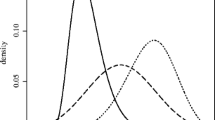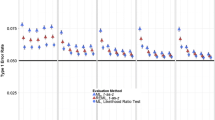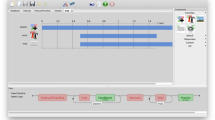Abstract
Two types of rotation are well known in psychometrics. The first of these is rotation to simple structure, widely known particularly in factor analysis and multidimensional scaling. Rotation to simple structure applies to the case where only a single scaling solution is available, and one wishes to array the configuration in a particular way relative to its axes; usually in such a way that each point projects as much of its variance as possible on a single axis and as little as possible on each of the other axes.
The second type of rotation applies when two scaling solutions are available and one wishes to compare them to each other. In this case, one rotates one or both of the solutions until they fit as well as possible to each other by some criterion. Sometimes rescaling, stretching and shrinking may be involved. This type of rotation is usually referred to as “Procrustes” rotation.
Neither of these rotation schemes is appropriate, howerver, when time series measurements are available. In the time-series situation, one is not particularly interested in the structure of the solution at any time, nor even in the comparison of any two structures adjacent in time. Rather one is interested in the underlying processes which may be found in the time series.
The kinds of processes which emerge from a time series of multidimensional measurements, however, are heavily dependent on the rotation rules by which one relates each of the structures in the time series of structures to each of the others.
In the present article, we discuss a weighted least squares rule, and illustrate the situations under which it is appropriate for discovering processes underlying time series measurements for Galileo-type scaling data. An example dealing with social perceptions of time is presented.
Similar content being viewed by others
References
BarnettG.A. & J.Woelfel (1979). “On the dimensionality of psychological processes”, Quality and Quantity 3: 212–282.
DurkheimE. (1965). The Elementary Forms of the Religious Life. New York: Free Press.
TorgersonWarren S. (1958). Theory and Method of Scaling. New York: Wiley.
Van derGreerJ.P. (1971) Introduction to Multivariate Analysis for the Social Sciences. San Francisco: Freeman.
WoelfelJ. & G.A.Barnett (1982). “Multidimensional scaling in Riemann space”, Quality & Quantity 16: 469–491.
WoelfelJ. & E.L.Fink (1980). The Measurement of Communication Processes: Galileo Theory and Method. New York: Academic press.
WoelfelJ., R.Holmes & D.L.Kincaid (1988). “Rotation to congruence for general Riemann surfaces under theoretical constraints”, in G.A.Barnett & J.Woelfel (eds.), Readings in the Galileo System: Theory, Method and Applications. Dubuque, IA: Kendall-Hunt.
ZerubavelE. (1981). Hidden Rhythms: Schedules and Calanders in Social Life. Chicago, University of Chicago.
ZerubavelE. (1985). The Seven Day Circle: The History and Meaning of the Week. New York: Free Press.
Author information
Authors and Affiliations
Rights and permissions
About this article
Cite this article
Woelfel, J., Barnett, G.A., Pruzek, R. et al. Rotation to simple processes: the effect of alternative rotation rules on observed patterns in time-ordered measurements. Qual Quant 23, 3–20 (1989). https://doi.org/10.1007/BF00195403
Issue Date:
DOI: https://doi.org/10.1007/BF00195403




